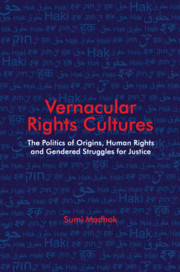 Vernacular Rights Cultures
Vernacular Rights Cultures Book contents
- Frontmatter
- Dedication
- Contents
- Acknowledgements
- 1 An Introduction: Vernacular Rights Cultures and Decolonising Human Rights
- 2 Refusing the Politics of Origins
- 3 Assembling a Feminist Historical Ontology of Haq
- 4 The Political Imaginaries of Haq: ‘Citizenship’ and ‘Truth’
- 5 Resisting Developmentalism and the Military: Haq as a Cosmological Idea and an Islamic Ideal
- 6 Conceptual Diversity, Feminist Historical Ontology and a Critical Reflexive Politics of Location
- References
- Index
6 - Conceptual Diversity, Feminist Historical Ontology and a Critical Reflexive Politics of Location
Published online by Cambridge University Press: 31 July 2021
- Frontmatter
- Dedication
- Contents
- Acknowledgements
- 1 An Introduction: Vernacular Rights Cultures and Decolonising Human Rights
- 2 Refusing the Politics of Origins
- 3 Assembling a Feminist Historical Ontology of Haq
- 4 The Political Imaginaries of Haq: ‘Citizenship’ and ‘Truth’
- 5 Resisting Developmentalism and the Military: Haq as a Cosmological Idea and an Islamic Ideal
- 6 Conceptual Diversity, Feminist Historical Ontology and a Critical Reflexive Politics of Location
- References
- Index
Summary
How to tell different stories of rights and human rights? How to tell stories of rights and human rights that are not only ever those of their origins, or of the powerful efforts by the powerful including by nation states to institutionalise global human rights, or of their unidirectional travel, translation and vernacularisation into ‘other worlds’, or indeed those about the humanitarian and military interventions by global powers. How to not tell stories of ‘different’ human rights where ‘difference’ is enacted through categorising difference as “cultural”, “custom”, “local’’ or as “case studies” of global human rights talk? How to refuse standardly narrated stories of human rights that speak of ‘difference’ while keeping the epistemic frameworks of global human rights talk intact and impervious to serious consideration of the ‘difference’ that historical difference makes to global rights talk? In short, how to tell ‘other’ stories of world-making and meaning-making on rights without either reproducing the vast epistemic power and the time–space provincialism of the global human rights discourse or compromising the complexity, dynamism, difference and epistemic and political struggles of human rights mobilisations in ‘most of the world’? These are the questions that constitute the burden of this book.
The stories of vernacular rights cultures that appear in this book aim at disrupting the originary, statist, institutional and Eurocentric stories that global human rights likes to tell about itself. Specifically, the stories of vernacular rights cultures make theoretical, conceptual and methodological claims to shine a light on different possibilities for engaging, imagining and expanding rights and human rights. Significantly, the stories of vernacular rights cultures signal that a theoretical and philosophical critique of global human rights alone cannot account for the life-worlds of subaltern struggles for rights and entitlements, or indeed for the critical vocabulary and political grammar within which these struggles and demands are articulated. For, quite simply, the terms of the critique of global human rights have been such that these end up resurrecting and reproducing the object of their critiques, that is, the West as the subject of human rights discourses albeit, this time via critique, while also simultaneously reproducing the global inequalities of knowledge production by investing epistemic agency in the West.
- Type
- Chapter
- Information
- Vernacular Rights CulturesThe Politics of Origins, Human Rights, and Gendered Struggles for Justice, pp. 173 - 184Publisher: Cambridge University PressPrint publication year: 2021


